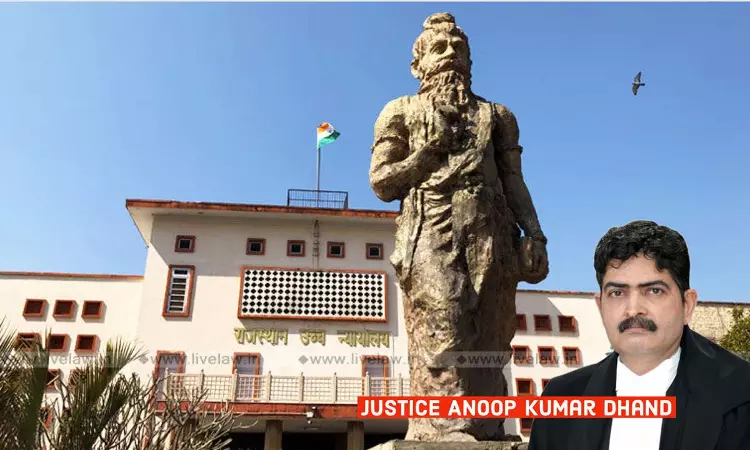- Home
- /
- High Courts
- /
- Rajasthan High Court
- /
- Returned Plaint Can't Be Tried...
Returned Plaint Can't Be Tried Again By Same Court In Absence Of New Specific Pleadings: Rajasthan High Court
Nupur Agrawal
27 May 2025 12:50 PM IST
The Rajasthan High Court has said that once a plaint was returned, the same could not be entertained by the same court based on same averments made in the earlier plaint, in the absence of any specific new pleadings or averments in the re-instituted case.Justice Anoop Kumar Dhand held the averments made in any application under Section 151, CPC, could not be considered part of the...
The Rajasthan High Court has said that once a plaint was returned, the same could not be entertained by the same court based on same averments made in the earlier plaint, in the absence of any specific new pleadings or averments in the re-instituted case.
Justice Anoop Kumar Dhand held the averments made in any application under Section 151, CPC, could not be considered part of the formal pleadings and hence, no suit could be re-registered, in the same court, based on that alone.
"Once a plaint is returned to the plaintiff, the same should not be entertained on the basis of the same averments made earlier in the same plaint. Unless and until a fresh suit with new averments regarding the cause of action is presented, the previously returned suit cannot be re-instituted or tried. In the absence of specific pleadings, the Commercial Court cannot entertain a suit that was previously returned, due to lack of jurisdiction, based on the assertions made about the defendant's business in Jaipur in any application submitted under Section 151 CPC. The averments made in any application under Section 151 CPC cannot be considered as part of the formal pleadings in the previous plaint, and therefore, the suit cannot be re-registered on that basis alone".
The Court was hearing a petition filed against the order of the Commercial Court wherein it allowed a plaint that was re-instituted, after being rejected earlier for lack of territorial jurisdiction, without any new averments or a single difference between the pleadings.
Respondent had filed a suit against the petitioner for permanent injunction and violation of registered design under the Designs Act, 20000, before a Commercial Court in Jaipur. Against this suit, the petitioner had filed an application to reject the plaint on the ground that the Commercial Court had no territorial jurisdiction to entertain the suit.
This application was partly allowed, and the plaint was returned to the respondent to be submitted before the competent court. One month later, based on certain discovered bills, vouchers and invoices issued by the petitioner indicating that the products were sold within Jaipur, the same suit was re-instituted.
The application under Section 151, CPC carried an averment that owing to the sale of disputed designs by the petitioner in Jaipur and across nation, the Commercial Court, Jaipur, had territorial jurisdiction. This was allowed by the commercial court, and notices of the plaint were issued to the petitioner. Hence, petition was filed before the Court.
The Court perused the records, and highlighted that, “…the contents and the pleadings in the plaint indicate that there is not a single difference, even of a coma or full top, between the plaint, filed prior to passing the order dated 21.01.2021 for returning the plaint, and the plaint which was filed after the above order. All pleadings in the paragraphs of the plaint are verbatim same and similar…In the successive suit, not a single averment has been made, in any of the paras or even in para No. 17 of the plaint, that the defendant is doing business by copying the design of the plaintiff at Jaipur or at any place falling within the jurisdiction of the Commercial Court”.
The Court held that overlooking all this, the commercial court entertained the application filed under Section 151, CPC, and allowed the same suit that was returned earlier.
Based on references to certain precedents, the Court stated that it was clear that while deciding the application for rejecting a suit, the court's primacy focus had to be on the contents of the plaint. The cause of action needed to be explicitly mentioned in the same, and if the same was not done, the plaint was liable to be rejected.
In this background, the Court opined that without incorporating any new facts in the plaint that the petitioner was doing its business in Jaipur or any averment in the plaint as to how the cause of action had arisen in the city, the plaint could not be entertained.
It was further ruled that merely certain averments made in the application under Section 151, CPC and certain issuance of bills, vouchers etc at Jaipur, could not be a sufficient ground to institute the same suit before the same court which earlier returned the same plaint.
Accordingly, it was held that the order of the Commercial Court was not legally sustainable in the eyes of law and hence, was liable to be set aside. The Commercial Court was directed to return the plaint to the respondent to file the same before the appropriate forum of law.
Case Title: Arta Broch Ceramics Private Limited v Clay Craft (India) Private Limited and other connected petition
Citation: 2025 Livelaw (Raj) 189



